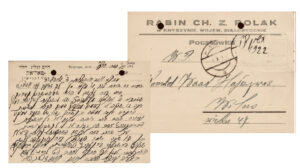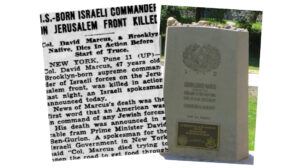The Miracle Officer


He leaned back in his chair. “Santo Rabino [holy rabbi]!” he exclaimed. “You know, I helped to rescue him from that ghetto. In general, I helped to rescue Jews. I admit that I did it all for money. Today, everyone talks about Schindler’s List. I did the same thing as he did”

Rebbe Aharon of Belz and his brother, Rav Mordechai of Bilogray, were surrounded by angels on their miracle flight out of Poland in the thick of war, with a price on their heads and the Gestapo at their backs. But while many of the stories and wonders of that journey have been rehashed by chassidim for years, one fact remained a mystery: who was that Hungarian officer who drove the group across Poland, evading checkpoints as if they were invisible? Sixty-five years ago this month, the Rebbe revealed the identity of his savior. And for sixty-five years, that revelation was hidden. Until now.
Almost seventy years have passed since the Rav Aharon of Belz and his half-brother the Rebbe of Bilgoray zy”a were whisked out of Europe and set foot on the earth of the Holy Land. The journey that rescued them from the Nazi claws could only be labeled miraculous but even today some pieces of the puzzle of that esoteric chapter in their lives remain hidden.
Much has already been published — in both English and Hebrew — about the numerous wonders that were wrought for the Rebbe; his brother Rav Mordechai of Bilgoray; and the Rebbe’s attendant Reb David Shapira on that hair-raising escape path so strewn with seemingly insurmountable obstacles. British researcher Yosef Israel illuminates the background drama in great detail in his 2005 book Rescuing the Rebbe of Belz (ArtScroll). But one point was never clarified until now: Who was the mystery Hungarian officer who drove the group across Poland into Hungary bypassing checkpoints and evading scrutiny in a way that could only be described as supernatural and what became of him after the war?
As the Rebbe himself said on occasion every Jew who survived the inferno must have been accompanied by angels on either side. How many Heavenly guardians watched over the group on their own flight through Poland to Hungary? Hashem’s Hand revealed itself on a daily basis taking the entourage through barriers that could not logically be passed along dangerous roads and through borders swarming with the forces of destruction — and eventually bringing them to Eretz Yisrael where the shoot of the majestic chassidic court that once was Belz would sprout and flourish anew.
Rav Aharon of Belz the “Wunder Rabbiner” was at the top of the Gestapo’s wanted list of rabbis targeted for extermination during the Nazi occupation of Poland. Through the efforts of Belzer chassidim in Israel England and the United States the Rebbe and his half-brother Rav Mordechai of Bilgoray twenty-two years his junior managed to stay one step ahead of the Nazis in one miraculous escape attempt after another — first being spirited out of Belz and eventually winding up in the Bochnia ghetto. Both men had already lost their entire families to the Nazis. Rebbe Aharon’s eldest son Moshe was burned alive in the Premishlan shul at the same time as Rebbe Aharon was in hiding in that town. Later Rabbi Moshe’s wife and five children were murdered. Rebbe Aharon’s eldest daughter Rivka Miriam and her husband Rabbi Shmuel Frankel both perished along with five of their seven children. The Rebbe’s other daughters Adel Twersky and Sara Bracha Rosenfeld with their children and two other sons Rabbi Yisrael and Rabbi Yehudah Zundel and their children also perished.
The holy brothers were eventually whisked out of occupied Poland and into Hungary by a reliable Hungarian counter-intelligence officer who was willing to rescue Jews for a price. Shorn of their beards and peyos they were disguised as Russian generals who had been captured at the front and were being taken to Budapest for questioning. Meanwhile rumors had spread in the ghetto that the Rebbe had disappeared. To curb the suspicions one of the close chassidim dressed up in Reb Aharon’s clothing and sat in his room with the door opened a crack imitating the way the Rebbe immersed himself in prayer and study. The ploy bought the escaping party just enough time to evade the authorities before they realized the Rebbe was gone.
While the chassidim and the Gestapo still believed the Rebbe was in an adjoining room he his brother and his attendant were in fact racing through the 250 miles of the Polish countryside in a Hungarian diplomatic vehicle experiencing their own set of miracles. Much of what took place on that incredible drive will remain forever a mystery but the Rebbe himself would recount three examples of Heavenly intervention as they drove through one checkpoint after another without being detained.
The Rebbe talked about an “eerie mist” that enveloped the car throughout the journey which seemed to render the car invisible. On arrival to Budapest the officer himself testified that the car was rarely asked to stop yet he had no problem navigating the vehicle — in front of it all was clear.
In another instance the car suddenly stopped dead. The officer who saw what had happened was wringing his hands in despair because to fix the problem would require a professional welder. Suddenly an old man appeared striding toward them. When they explained the problem to him he took a screwdriver from the leather sash tied around his waist tinkered under the hood and the motor sprang to life.
Years later the Rebbe told this to the Sadigurer Rebbe who responded that “a man with a leather sash wrapped about his waist” is a reference to Eliyahu HaNavi. The Rebbe it is told didn’t respond but smiled enigmatically.
One of the oft-repeated miracles the chassidim tell took place at the Hungarian border checkpoint. Up to this point at most of the border checks the officer managed to wave some mysterious documents at the guard who ushered them through. Now the border guard stopped them for inspection but wasn’t satisfied with these documents. Pointing his gun at them he ordered them out of the car. Suddenly out of nowhere three senior officials appeared and instructed the guard to release them immediately and to let them continue on their way.
The Bilgoray Rav when he used to tell this wonder-tale would add “Those three officials were none other than our fathers the three Belzer Rebbes may they rest in Eden ...” — his father Rebbe Yissachar Dov; his grandfather Rebbe Yeshiele; and his great-grandfather Rebbe Shalom.
In Ungvar the holy brothers’ first stop after crossing the border the Hungarian officer’s mission was concluded. The Rebbe and his brother spent eight months in Hungary waiting for highly-rationed “certifikats” from the Jewish Agency to enter Palestine which they received in January 1944. Less than two months later the Nazis invaded Hungary and deported its 450 000 Jews.
And the enigmatic heroic Hungarian officer? Where did he go what became of him and … what was his name? No one knew. The secret was buried with the Rebbe himself. Until now.
The answer to the riddle was actually revealed in two parts. One was a recently discovered packet of letters uncovered by the Belzer monthly journal Ohr Hatzafon and the other was an incident recounted by Mishpacha editor-in-chief Rabbi Moshe Grylak about his brother-in-law Reb Mordechai Landau z”l.
Oops! We could not locate your form.













